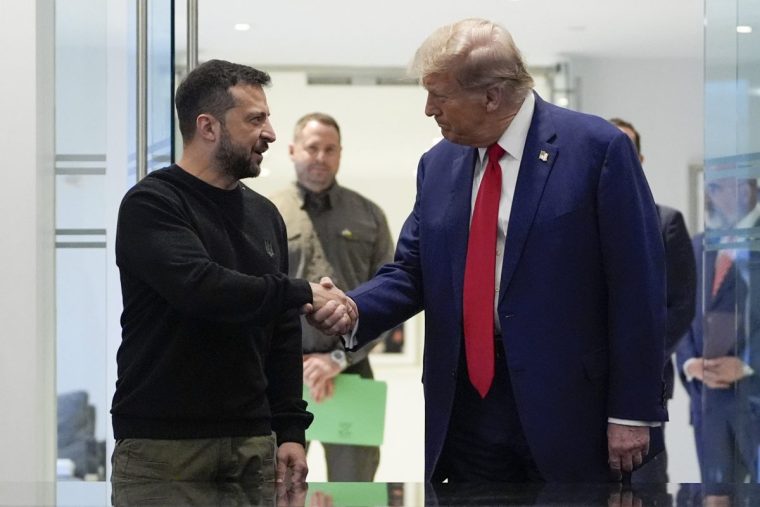Ukraine has denied reports it could acquire nuclear weapons within months following the re-election of Donald Trump.
The Ukrainian foreign ministry was responding to an article in The Times, which cited a briefing document, prepared by a non-government think-tank for the Ukrainian defence ministry.
The document outlines how Kyiv could develop a rudimentary atomic bomb if the US withdraws its military assistance, but did not reveal if the Ukrainian government was ever presented with the document.
Foreign ministry spokesperson Heorhii Tykhyi said on X: “Ukraine is committed to the NPT [the Treaty on the Non-Proliferation of Nuclear Weapons]; we do not possess, develop or intend to acquire nuclear weapons.
“Ukraine works closely with the IAEA [International Atomic Energy Agency] and is fully transparent to its monitoring, which rules out the use of nuclear materials for military purposes.”
It comes as The Times, citing the document, reported Ukraine could build a basic device from plutonium with a similar technology to the “Fat Man” – the bomb dropped on Nagasaki by the US in 1945.
“Creating a simple atomic bomb, as the United States did during the Manhattan Project, would not be a difficult task 80 years later,” the document reads, before adding the bomb would be 10 times less powerful than the original.
The report states that Ukraine could use plutonium extracted from spent fuel rods taken from Ukraine’s nine nuclear reactors.
“That would be enough to destroy an entire Russian airbase or concentrated military, industrial or logistics installations. The exact nuclear yield would be unpredictable because it would use different isotopes of plutonium,” said the report’s author, Oleksii Yizhak.

It adds that Ukraine could use some of its nuclear expertise due to the country previously being home to the world’s third largest nuclear arsenal during the Soviet era.
Ukraine’s nuclear capabilities came under the spotlight last month after Ukrainian President, Volodymyr Zelensky, said he told Donald Trump that Ukraine must either join Nato or pursue nuclear capabilities for the country’s protection.
Zelensky later walked back the comments, saying that Kyiv is not pursuing nuclear weapons and the remarks were made to emphasise the failures of the Budapest Memorandum.
According to International Campaign to Abolish Nuclear Weapons: “Ukraine never had an independent nuclear weapons arsenal.
“When the Soviet Union broke up in 1991, there were thousands of former Soviet nuclear warheads, as well as hundreds of intercontinental ballistic missiles and bombers, left on Ukraine’s territory, which it decided to transfer to Russia.
“In 1992, Ukraine signed the Lisbon Protocol and it joined the Nuclear Non-Proliferation Treaty as a non-nuclear weapon state in 1994. The transfer of all nuclear material took some time, but by 2001, all nuclear weapons had been transferred to Russia to be dismantled and all launch silos decommissioned.”
Despite this, Russian media often claim Ukraine is building nuclear weapons. Kremlin-linked media, citing an unnamed source in March 2022, claimed Ukraine was close to building a plutonium-based “dirty bomb” nuclear weapon in Chernobyl, although the source cited no evidence.
Writing in The New Voice of Ukraine, political analyst Oleksiy Koshel said the claim about nuclear weapons in Ukraine is “baseless and harmful”.
“There is no evidence that this document was considered by the Ukrainian Ministry of Defence or the Ukrainian General Staff, that this document was handed over to the Office of the President or the National Security [and Defence] Council, that this document was used,” he said.
Meanwhile, Kyiv faces questions about the future of the country following the election of Donald Trump, whose position on Ukraine is often ambiguous, with Trump regularly claiming in his election campaign that he could end the Ukraine war “in a day”, without offering any further detail.
Running mate JD Vance’s position was more definitive after he outlined a plan that would allow Russia to keep the territory it seized in Ukraine, which has caused angst among millions of Ukrainians, particularly those living in Russian-occupied Donetsk, Luhansk, Zaporizhia, Kherson and Crimea.



Maurice Saatchi: I used to adore capitalism – then I had lunch with Margaret Thatcher